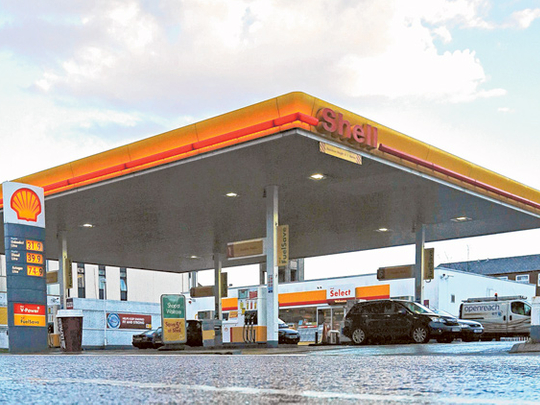
London: Royal Dutch Shell PLC said on Thursday it plans to continue investing aggressively in new projects in the coming years, as it sees a bright future for the oil and gas industry despite ongoing economic uncertainties around the world.
Overall, Europe’s largest oil company was bullish as it reported an increase in fourth-quarter earnings: it said global energy demand is rising due to population increases and improving standards of living in developing countries.
Chief Executive Peter Voser said in a video message published on YouTube that at this point “we are more constrained by limits on capital (funding) than by limits on opportunities.”
Voser’s bullish statement came even though the company announced a below-expectations 2.6 percent increase in net profit to $6.67 billion fourth quarter net profit.
In addition, Shell said it will hike its dividend in 2013 to $0.45 per share, a 4.7 increase from the year before. Though some analysts have argued Shell has room to raise its dividend more, Voser claimed Shell’s dividend is already “the largest in our sector.”
“As our cash flow momentum builds we expect to increase our dividends for shareholders in measured, affordable steps,” he said. “There is more to come from Shell.”
Shell’s shares were down 1.1 percent to ?26.545 in early Amsterdam trading.
A more detailed look at the figures showed that the company’s key “upstream,” or exploration and production, division posted earnings of $4.38 billion, down from $5.1 billion a year earlier. Shell blamed the decline on higher costs and exploration expenses - Shell is spending heavily to explore for oil in frigid Arctic waters off Alaska’s coast, and has run into several difficulties.
Although the production profits were down, production volumes increased by 3.3 percent to 3.41 million barrels of oil or natural gas equivalents per day, as increases at major young projects in Qatar and Australia offset declines at existing fields.
The increase in fourth quarter profit was mostly due to a turnaround at Shell’s smaller refining arm, which booked a profit of $1.2 billion, compared with a loss of $278 million in the same period of 2011.
Richard Hunter, head of equities at Hargreaves Lansdown Stockbrokers, said Shell’s “overall profit number was shy of expectations: costs are on an upward trend within the industry and the weakness of the gas price has impacted on Shell, which for the first time sold more gas than oil last year.”
However, he said there were “certainly positives within the statement,” notably refining margins and “upbeat management comments.”
Voser said the company is on track to meet its goal of increasing operating cash flow by 30-50 percent in the four year period 2012-2015, that would imply a total cashflow of $175-$200 billion. Shell booked $42.7 billion in cashflow in 2012.
He said the company’s investment spending will focus on assets such as gas, deep water projects and shale. The company is planning to spend $33 billion on capital investments this year, up from $32.5 billion in 2012.
Shell has purchased significant US shale assets, which contain natural gas that has only recently become exploitable due to new drilling techniques known as “fracking.” This week Shell announced a project with pipeline company Kinder Morgan to export liquefied natural gas, or LNG, from the US in order to take advantage of gas prices that are much higher internationally.
The company is spending on around 30 projects around the globe, including in Iraq, Kazakhstan and even onshore Nigeria - where a Dutch court Wednesday ordered it to pay damages caused to fish farms in one village after thieves sabotaged a Shell pipeline.












